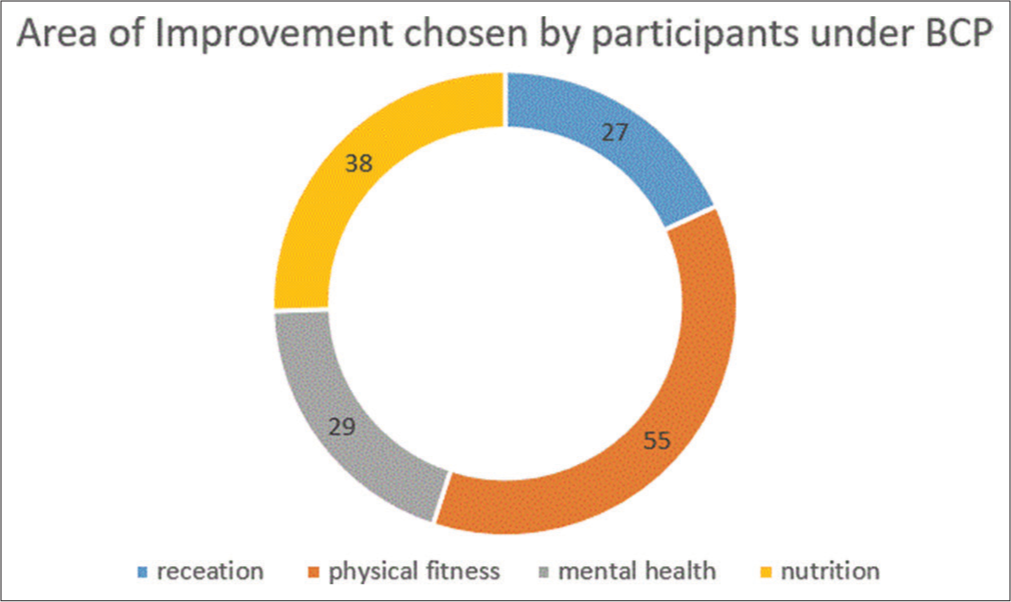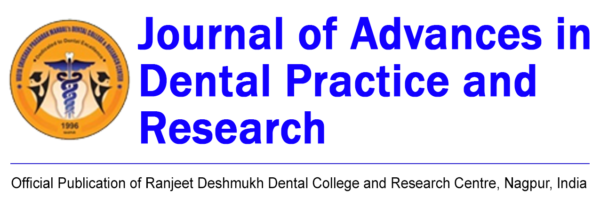Translate this page into:
Effect of behavior change plan on the wellness of dental students
*Corresponding author: Dr Vrushali Phate, Department of Prosthodontics and Crown and Bridge, A B Shetty Memorial Institute of Dental Sciences, Mangaluru, India. vrushaliphate05@gmail.com
-
Received: ,
Accepted: ,
How to cite this article: Phate VV, Deshpande S. Effect of behavior change plan on the wellness of dental students. J Adv Dental Pract Res. 2024;3:7-9. doi: 10.25259/JADPR_15_2024
Abstract
Objectives:
The purpose of this study was to evaluate the efficacy of a behavior change plan (BCP) on the well-being of dental students.
Material and Methods:
First and second-year bachelor of dental surgery (BDS) students were sensitized regarding the importance of a healthy lifestyle and asked to choose any one/more areas of fitness to improve on. Pre-test scores were recorded. For the next 6 months, follow-up reminders were given to keep them on track. Post-test scores were recorded at the end of 6 months.
Results:
Overall wellness score showed improvement at the end of 6 months, maximum students completed their target behavior.
Conclusion:
A BCP is an effective method to inculcate principles of a healthy lifestyle among dental undergraduates.
Keywords
Dental students
Behavior change
Wellness
INTRODUCTION
Researchers suggest that personal behavior causes more than 50% of illnesses. With lifestyle behavioral choices contributing to a significant proportion of chronic diseases globally, evidence-based strategies to improve behavioral risk factors, such as healthier eating and regular physical activity should be considered in a variety of settings, especially for future healthcare professionals. Research findings support the need for targeted interventions that facilitate enhanced development and well-being among college students.[1-5]
Aim
The aim of the study was to evaluate the effectiveness of a behavior change plan (BCP) initiative to improve personal health among dental students.
MATERIAL AND METHODS
Initially, a sensitizing session was conducted for dental students from 1st to 2nd years BDS in the college, explaining the importance of health lifestyle and the concept of BCP.
A format for wellness was circulated among them and they were asked to reflect on their lifestyle under various categories such as nutrition, recreation, physical fitness, and mental well-being. They were asked to submit it after careful consideration to the area of wellness to be chosen. They were asked to first analyze their present behavior in the target area. Then formulate goals which are specific, measurable, achievable, relevant, and time-bound (SMART). They were asked to monitor the progress and report every month for the next 6 months.
A one-group pre- and post-test design was utilized to conduct a quantitative analysis of reported BCP success and qualitative evaluation was done by semi-structured interviews of participants’ perspectives of obstacles, behaviors important toward goal attainment, and the benefits of the BCP.
Qualitative data analysis of semi-structured interviews revealed following themes
There was a self-perceived need for improvement in lifestyle. Lack of motivation, procrastination, and issues with time management were key challenges encountered by maximum participants. This intervention in the form of BCP served as a constant reminder that enabled them to stay on track. Timely follow-ups and support were the enabling factors mentioned by the participants.
RESULTS
Goal achievement data were tabulated for each focus area, and report narratives distilled into common themes at the end of 2 months.
The areas of improvement under BCP chosen by the students are depicted in Figure 1.

- Different areas of improvements chosen by participants. BCP: Behavior change plan
157 students participated in this study. Mean pre-test scores out of 100 were 55.5, and the mean post-test score was 75.7. Regarding area of improvement, out of 157 participants, 55 chose physical fitness, 29 chose mental health, 27 chose recreation, and 38 chose nutrition.
126 out of 157 participants were able to complete their target successfully.
Qualitative data analysis of semi-structured interviews revealed following themes
There was self-perceived need for improvement in lifestyle. Lack of motivation, procrastination, and management were key challenges encountered by maximum participants. This intervention in the form of BCP served as a constant reminder that enabled them to stay on track. Timely follow-ups and support were the enabling factors mentioned by the participants. issues with time.
DISCUSSION
Importance of a healthy lifestyle cannot be overemphasized for all age groups, especially in the young student population. Although the institutions prepare them for their professional life by imparting necessary knowledge and skills, making them adopt a sustainable stress-free way of living is also equally important.
Burnout is a common condition that affects performance and quality of life. It affects over 50% of physicians and approximately 30% of the general population. Burnout is characterized by emotional tiredness, depersonalization, and a lack of purpose. These symptoms can appear as early as the 1st year of medical school and can occur in a variety of practice settings, regardless of gender, career stage, field, or specialization.[1]
Burnout is associated with lower satisfaction, a lower quality of life, a worse work-life balance, and a higher incidence of substance abuse, depression, and suicide among affected individuals. Medical errors and inadequate patient care are linked to physician burnout. In addition, job turnover, presenteeism, and absenteeism result in higher expenses and decreased productivity for healthcare systems.[1,2]
The percentage of college students who report experiencing psychological distress, depression, and anxiety has greatly increased over the past. Many college students often partake in harmful habits, which put them at risk for major health issues down the road.
Adolescents who experienced positive well-being were more likely to engage in low-risk health activities as young adults. Encouraging wellness among academics improves mental and physical health and lowers the incidence of sickness.[3]
This study involved the implementation of behavioral change plan in the following stages:
Identifying the need for improvement-contemplating the present habits
Deciding a specific target behavior, identifying challenges, and their solutions
Formulating SMART goals
Practicing the target behavior
Asking for support in case of difficulty
Completing the target.
The main purpose was to make students self-reliant and self-directed toward their holistic health. It was found that the students understood the process and learned the skill of maintaining a healthy lifestyle.
Thus, such interventions are necessary for holistic development of students and impart them skills to maintain healthy work-life balance.
CONCLUSION
Completing a BCP is a useful and efficient exercise that enables dental students to practice the strategies and skills of incorporating healthy habits into their daily lives.
It is highly recommended as a tool to make the students understand, introspect, and implement behavior change plans which will ultimately help them to become successful professionals.
Ethical approval
The research/study approved by the Institutional Review Board at VSPM Dental College and Research Centre, Nagpur, VSPM’S DCRC/IEC/UG/14/2017 Dated 11th September 2017.
Declaration of patient consent
The authors certify that they have obtained all appropriate patient consent.
Conflicts of interest
Dr. Saee Deshpande is on the Editorial Board of the Journal.
Use of artificial intelligence (AI)-assisted technology for manuscript preparation
The authors confirm that there was no use of artificial intelligence (AI)-assisted technology for assisting in the writing or editing of the manuscript and no images were manipulated using AI.
Financial support and sponsorship
This research project was selected for a short term research grant by Maharashtra University of Health Sciences Nashik.
References
- Planning, practicing, and prioritising wellness through an integrative behaviour change plan. Health Educ J. 2016;75:823-32.
- [CrossRef] [Google Scholar]
- Using behavior change plans to make wellness an informed priority: Health education meets general education. In: NERA Conference Proceedings. 2015. p. :1.
- [Google Scholar]
- Developing behavior change interventions for self-management in chronic illness: An integrative overview. Eur Psychol. 2019;24:7-25.
- [CrossRef] [PubMed] [Google Scholar]
- Integrative approach to lifestyle management: Implications for public health research and practice in the context of SDG-3. J Ayurveda Integr Med. 2023;14:100796.
- [CrossRef] [PubMed] [Google Scholar]
- Motivating the unmotivated: How can health behavior be changed in those unwilling to change? Front Psychol. 2015;6:835.
- [CrossRef] [Google Scholar]






